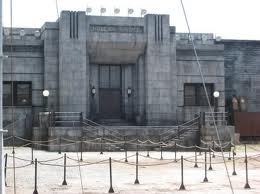 It’s been a long, long time since I blogged here. But tonight I saw Hunger Games and I simply had to write about it.
It’s been a long, long time since I blogged here. But tonight I saw Hunger Games and I simply had to write about it.
I read Hunger Games and Catching Fire in the summer of 2010. Then I had to endure the maddening wait for Mockingjay to be released. I chose not to re-read the book before seeing the movie which helped me enjoy it without the frustration of comparing it to the book.
Generally, I really enjoyed the movie. Jennifer Lawrence is a fantastic Katniss Everdeen. Her quiet charisma gave her a commanding presence throughout the movie. She’s a wonderful heroine; brave, generous, selfless, and clever. Her portrayal of Katniss is graceful and believable.
One thing that bothered me about the film: what is it with those endless out-of-focus non- stop super-close-up jerky hand-held shots? WHY WHY WHY? They’re annoying, distracting, and make the action hard to follow. I realize that at times, the effect is intentional. It blurs (literally) the graphic violence of teenagers getting murdered. But still, it was really distracting.
stop super-close-up jerky hand-held shots? WHY WHY WHY? They’re annoying, distracting, and make the action hard to follow. I realize that at times, the effect is intentional. It blurs (literally) the graphic violence of teenagers getting murdered. But still, it was really distracting.
The set designs were spectacular. The Capital is full of people wearing garish colours and absurd hair styles. Symbolic of the vacuous nature of their society and the shallowness of their values.
The palatial centre of President Snow as well as the stadium are designed with a combination of austerity and classical features. They’re highly reminiscent of ancient Greek  and Roman architecture. Actually, they kind of reminded me of those Biblical movies from the 50’s and 60’s that depict the ancient classical period. That, of course, recalls the ancient Gladiators. Human nature doesn’t really change. I recall the chills I felt when I read Shirley Jackson’s short story The Lottery, when I was a pre-teen.
and Roman architecture. Actually, they kind of reminded me of those Biblical movies from the 50’s and 60’s that depict the ancient classical period. That, of course, recalls the ancient Gladiators. Human nature doesn’t really change. I recall the chills I felt when I read Shirley Jackson’s short story The Lottery, when I was a pre-teen.
What I find truly fascinating though, is a pattern that you see repeatedly in dystopian stories – made popular by Hunger Games. The conflict usually arises from an evil government that exerts an extreme and frightening level of control over citizens lives,.
But here’s the deal. We live in a society that increasingly demonizes the wealthy. The term ‘corporate’ is now a pejorative term that’s synonymous with greedy, rapacious, and predatory. People who unfairly use their power to rob others of their environmental, political, and consumer rights. Is there truth in this assumption? No doubt. However abusive some multi-nationals might be, and no matter how much they might benefit from crony  capitalism… there’s a huge difference between them and a large government.
capitalism… there’s a huge difference between them and a large government.
We live in a culture that demonizes successful business people, demands that government be given more powers to redistribute wealth (social justice) and passes endless laws and regulations in response to personal tragedies.
The concentration of power in the hands of the few over the many is despised when it  comes to entrepreneurs and businesses. But as unsavoury as successful corporations can be, there’s a huge difference between them and government.
comes to entrepreneurs and businesses. But as unsavoury as successful corporations can be, there’s a huge difference between them and government.
They don’t have the power of the police, army, and a system of incarceration at their disposal.
Why are we as a society so comfortable with an extreme concentration of power in the hands of the few when it comes to government? Are politicians really so pure? And why do we have faith in bureaucrats? Are they so superior to us that we endow them with the power of the state?
The writer George Jonas once said that it’s human nature for certain people to rise to the top of the power chain no matter what the political system. Whether it’s communism fascism, capitalism – whatever-ism. Certain individuals posses the drive and the means to attain power within any political system.
The governing system within the Hunger Games is clearly a nightmare of corruption, tyranny, and abuse. The districts are all impoverished labour camps, populated with starving slaves who supply the materials and goods that fuel the ostentatious lifestyle of the Capitol. And the evil tyranny of the Capital is personified by the leader, President Snow.
Civil liberties are critical because they protect each and every individual from the tyranny of the state. It’s a zero-sum game. The more power the government gets, the less you have. Anyone who writes or loves a dystopian story that portrays an evil government with total power to tyrannize the citizenry really ought to stop and consider this. You may think that it’s only ‘fair’ for government to guarantee equality of outcomes… When you seek to grant government more powers to legislate how you eat, drink, speak, worship, raise your kids, whether you can keep your money, etc, you’re pushing your government closer to the dystopian nightmare that you fear. Maybe you like what government is doing with powers right now, but once you cede that control over to politicians and bureaucrats, you might not like where that power leads.
So there’s my rant. Dystopians are ‘what if’ scenarios, they take the prospect of concentrated power to a dangerous extreme. They almost exist as cautionary tales, written by people, who for the most part probably believe in ‘social justice’ and the extension of government powers.
Go figure.
It’s still a great movie and book.
